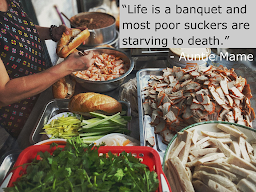In this post, I think about why religion is often disparaged because "it is man-made" — a claim often made by evangelicals who espouse their own brands of religion that typically vilifies mainstream faiths to bolster their own belief systems.
 |
| Saint Peter's Square, Vatican City image: bbc news |
Why do people despise religion because it is “man-made”? Does this presuppose a form of worship that is not man-made? Doesn't it sound odd to you that someone would tout this idea that their religious practice is not religious at all but is protected from man-made shenanigans?
Conversation With a Fundamentalist Christian
I was in the Safeway the other day. Someone was talking about the Catholics next to the $1.00 jug of Sweeeeet Tea for sale.
“I pray my rosary.”
“The rosary is idolatry. It's man-made.”
“So, what isn't man-made?”
“But, it is religion. Not true Christianity.”
“Throw out that statue of Mary in your room; that's man-made and not of God.”
Is Christianity Man-made?
It seems that the crux of the conversation revolved around getting rid of 2000 years of Christian history because it is all man-made.
Don't people realize that religion, no matter what package it comes in: non-denominational, Pentecostal, Wiccan, Zeus, Anansi, Sikh, Tao — it is all man's approach to the concept of God?
Religion Is More Pervasive Than You Think
As far as I know God has not torn apart the skies and told us how she thinks. So, even if you believe your holy writ is God's word it does not place you in a nice cocoon of impunity. You're man-made like the rest of us even if you pray to God in the comfort of your room and eschew organized religion like most people eschew post-dated dairy products.
Religion and Power
Religion is about power. By religion I mean a body of knowledge that supports belief in some form of theism. Religious people bristle at the claim that religion is about power. “Religion? Sure,” they say, “religion is about power. But I'm spiritual. Religion is man-made.”















